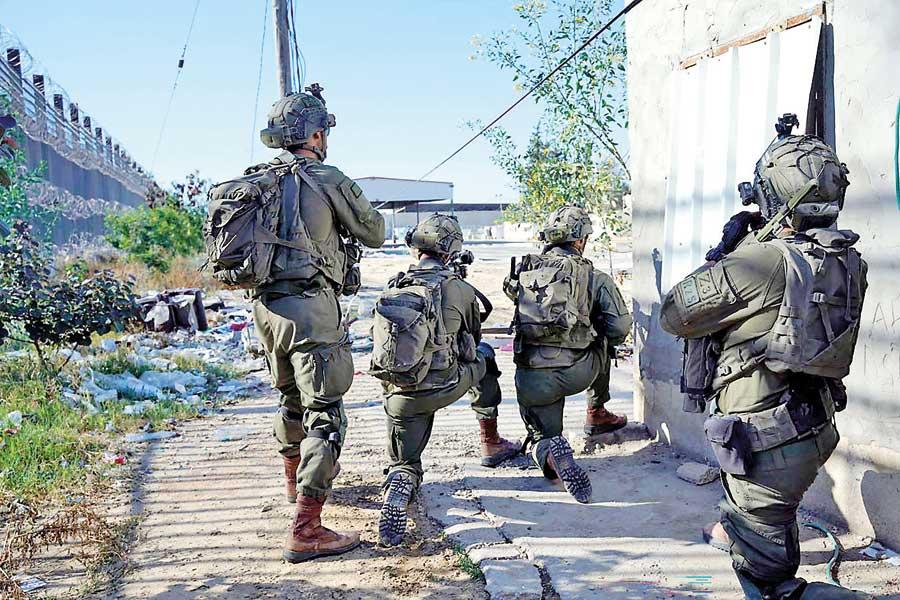Reply To:
Name - Reply Comment
Last Updated : 2024-05-20 18:11:00

Israeli forces operating in Rafah in the southern Gaza Strip. (Pic by Israeli Army via AFP
With or without a ceasefire deal, Israel has vowed to launch its grand invasion into Rafah, the Gaza Strip’s southernmost 64-square-kilometre area, where more than 1.5 million repeatedly battered and displaced Palestinians are crammed. Israeli troops have moved into Rafah and are now controlling the eastern part of the Rafah border with Egypt.
battered and displaced Palestinians are crammed. Israeli troops have moved into Rafah and are now controlling the eastern part of the Rafah border with Egypt.
Those who closely follow Israel’s genocidal campaign in Gaza know that Rafah has been under regular Israeli bombardments almost from the beginning of the war, even though the Benjamin Netanyahu government had declared southern Gaza, including Rafah, a safe zone and urged the people in northern Gaza to move there.
But the Israeli government’s Rafah war plan is caught in a whirlwind, with Hamas declaring that it has accepted the ceasefire deal jointly worked out by Qatar, Egypt, and the United States. The hardline Israeli prime minister was caught flat-footed. He rejected the deal. Only last week, Netanyahu came in for praise from US Secretary of State Anthony Blinken for being generous in offering concessions for a ceasefire and hostage deal.
Hamas initially refused to accept the deal, but in a last-minute drama at the Cairo airport, the Hamas delegation agreed to it just before their departure to Qatar. They made two minor changes to the Israeli-approved document that was rushed to them by Egyptian officials. Hamas’ nod put Netanyahu in a spin. He turned his focus on the Rafah invasion, ignoring friendly warnings from Israel’s closest and all-crime friend, the United States, against such a move.
He probably believes a victory in Rafah will offer him a straw to cling to in Israel’s crisis-ridden coalition politics.
Netanyahu’s popularity at home is at an all-time low. He is being criticised for giving priority to his political survival over the need to bring hostages home. Hamas’ willingness to accept the ceasefire deal will make him a loser. If the ceasefire deal comes through, Netanyahu will have little to prove that he has achieved the objectives he spelt out at the outset of the war on October 7. His main objectives are to eliminate Hamas, rescue the hostages and ensure Israel’s security.
Despite Israel’s increased war tempo in Rafah, Hamas remains a fighting force. Most Palestinians in the Gaza Strip see them as saviours, even though nearly 120,000 Gazans have been killed or injured in the seven-month-old war. Regardless of a ceasefire deal, analysts say Hamas is capable of continuing the resistance by military means for as long as it takes.
In contrast, Netanyahu is facing international isolation and defeat in war and politics. He is doomed whichever way he moves. If he continues the war, he will lose his international support. If he signs the ceasefire deal with Hamas, he will lose the support of hardliners. To navigate this dilemma, he needs a face-saving strategy.
The US and his other Western allies have warned him not to proceed with a grand invasion, which they say will bring about an unprecedented humanitarian catastrophe. Ignoring their advice, the Israeli war cabinet decided Monday night to launch the military operation in Rafah. In a symbolic reaction, Washington halted a shipment of 2000-pound bombs to Israel.
Though some Western analysts see US President Joe Biden’s decision as politically significant, the suspension of the arms shipment hardly makes a dent in the superior firepower Israel has built over the years with US and Western armaments. Israel must surely have enough US-made 2000-pound bombs to continue its genocide in Gaza.
Supplies of such civilian-killing weapons make the Biden administration complicit in Israel’s genocide in Gaza. Thousands of Palestinian children lost their lives, limbs, and parents due to Israel’s use of these US-supplied bombs. They are not precision bombs. When detonated, they can kill or cause severe injury to people within a radius of 800 metres from the point of impact in open areas.
In an interview with CNN on Wednesday, Biden admitted that these US weapons “have been used historically to deal with Rafah, to deal with the cities -- that deal with that problem.”
It is wrong to continue supplying those weapons systems, he said. His remarks came as he was losing the Democratic Party’s progressive vote bank, the Muslim vote and the support of university students.
The genocide-causing capability of these US-supplied weapons, Biden’s announcement of suspension of weapons supplies also appeased Israel. He added the usual rider that the US is committed to Israel’s defence.
The US action and the progress in the ceasefire talks have pushed Netanyahu into a corner, prompting him to perform a balancing act. He is under continous US pressure to accept the ceasefire deal. The US Central Intelligence Agency (CIA) chief, William Burns, was in Israel yesterday, waiting for a positive response from Netanyahu to the ceasefire deal.
Netanyahu is going ahead with his Rafah move on a staggered basis. The first target was the eastern side of the Rafah border crossing. As the Israeli troops moved in, more than 100,000 displaced civilians fled the area. Doctors and patients abandoned the only hospital there. Several mass graves at Gaza’s other destroyed hospitals have added to their fear that the invading army would destroy their hospital and kill the doctors and patients in execution style.
Netanyahu is playing safe and buying time until his unhappy coalition partners, the US in particular, come to terms with his step-by-step Rafah invasion. Contrary to his much-hyped grand invasion of Rafah, the Israeli Defence Forces have only taken control of the border crossing.
This was not the final victory his hardline cabinet colleagues, such as National Security Minister Itamar Ben-Gevir, hoped for. Ben-Gevir and the like are opposed to any ceasefire deal with Hamas. They have pooh-poohed the previous US efforts and interpreted any ceasefire deal as a victory for Hamas, Iran, and Hezbollah.
Yet control of the border is strategically important for Israel because Hamas has built tunnels connecting Gaza and Egypt’s Sinai Peninsula. Israel has claimed it has detected and destroyed the shafts of 14 such tunnels. Most of the tunnels are along Rafah’s western border, which Israel has yet to capture. Israeli troops cannot take full control of the entire Rafah border without escalating the war and causing heavy civilian casualties.
In another development that confirms Israeli policy of using starvation as a weapon of war, Israel is using the control of the Rafah border to choke off the entry of life-saving aid into Gaza.
The Egyptians fear the Rafah war could see hundreds of thousands of Palestinians fleeing into Sinai. Egypt is pushing for a ceasefire to avert such an eventuality and also to end the Red Sea Houthi attacks, which have deprived it of billions of dollars in Suez Canal revenue.
The US and regional players should double down on their diplomatic efforts in the coming days to make the ceasefire deal a reality and to avert a full-scale war in Rafah.

Add comment
Comments will be edited (grammar, spelling and slang) and authorized at the discretion of Daily Mirror online. The website also has the right not to publish selected comments.
Reply To:
Name - Reply Comment
The state-run loss-making State Mortgage & Investment Bank (SMIB) has reveale
US authorities are currently reviewing the manifest of every cargo aboard MV
On March 26, a couple arriving from Thailand was arrested with 88 live animal
According to villagers from Naula-Moragolla out of 105 families 80 can afford
4 hours ago - 0 - 54
20 May 2024
20 May 2024

18 May 2024